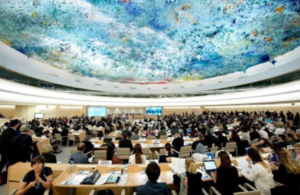UK Statement on the Resettlement of Syrian Refugees Conference in Geneva
UK Statement at the Global Responsibility-Sharing through Pathways for Admission of Syrian Refugees Conference, Geneva, 30 March 2016.

The Resettlement of Syrian Refugees Conference takes place at the Palais des Nations in Geneva
Thank you Mr. Chairman.
Excellencies, Distinguished Delegates, Ladies and Gentlemen, I would like to thank UNHCR for organising this important event. As the Syrian conflict enters its sixth year, none of us can fail to be moved by the plight faced by Syrians who have suffered so much. The UK welcomes the opportunity to work together to strengthen the global response to the Syria crisis.
Last month, the UK was proud to co-host the Supporting Syria and the Region conference. This event saw leaders from around the globe pledge over 11 billion dollars of support to Syria - the largest sum ever raised in a single day for a humanitarian crisis. Money that will help to deliver real and lasting change for the people affected. The London conference showed that when we focus on an issue, and demonstrate real political will, we can rise to some of the biggest challenges of our time.
For the UK’s part, the Prime Minister announced that the UK will more than double our support to the Syria crisis to over £2.3 billion.
The vast majority of this resource will be spent supporting refugees and displaced people in Syria and the region. We want to give refugees the chance to make a life close to their home. We believe that this is the most effective way of helping the large majority of the refugees and their host communities.
However, we recognise that there are particularly vulnerable refugees whose needs can best be met through resettlement. Targeted resettlement is therefore a modest, but important, part of our response to the Syria crisis. It is one of the ways in which we aim to reduce the need for refugees to make dangerous journeys, often in the hands of ruthless criminals.
So, since 2014, we have worked with UNHCR to identify and resettle those most in need through our Vulnerable Persons Resettlement Scheme for Syrians. In September last year, the Prime Minister announced that this Scheme would be expanded in order to resettle 20,000 vulnerable Syrians. I am delighted that we reached our target to resettle the first 1,000 of these refugees by last Christmas.
The UK has worked closely with IOM and UNHCR to ensure that their outreach activities identify and support the most vulnerable. And we have provided significant funding to ensure that all refugees arriving in the UK have housing, healthcare, English language lessons, education and access to appropriate support services tailored to their individual needs.
I believe that several factors have been critical to our success. First, we have put the needs of refugees at the heart of our scheme, ensuring that they receive the tailored care they need.
Secondly, we have established excellent collaboration with UNHCR, IOM and host countries at one end of the process, and with UK local government at the other.
Thirdly, we have matched our warm words with concrete action granting additional resources to UNHCR and IOM, and allocating dedicated financial resource from our overseas development budget to cover the first year costs of supporting refugees in the UK.
And fourthly, we have established a cross-Government team under Ministerial leadership in order to rapidly scale up the programme. I think I may be one of very few Ministers with responsibilities in three different Government Ministries and with the title of “Minister for Syrian Refugees”.
While we are proud of the part we are playing, we know that we can continue to learn and improve. For the near future, we plan to do more to harness the generous offers of support from the UK public by developing a community sponsorship scheme. This scheme will allow individuals, charities, faith groups, churches and businesses to support refugees directly. We are also aiming to learn more about the refugees we are accepting in order to match them more effectively with opportunities for employment in the UK. And we want to recognise the special needs of children affected by the conflict. Therefore, on top of our resettlement commitment of 20,000, the UK has committed to work with the UN High Commissioner for Refugees to lead a new initiative to resettle unaccompanied children from conflict regions, where it is in the children’s best interests.
Learning, we believe, is best done together. So, once again, we welcome this conference as an opportunity to hear from each other. And we stand ready to offer our support to those countries who wish to take part in resettlement by sharing our expertise and experience.
Thank you Mr Chairman.